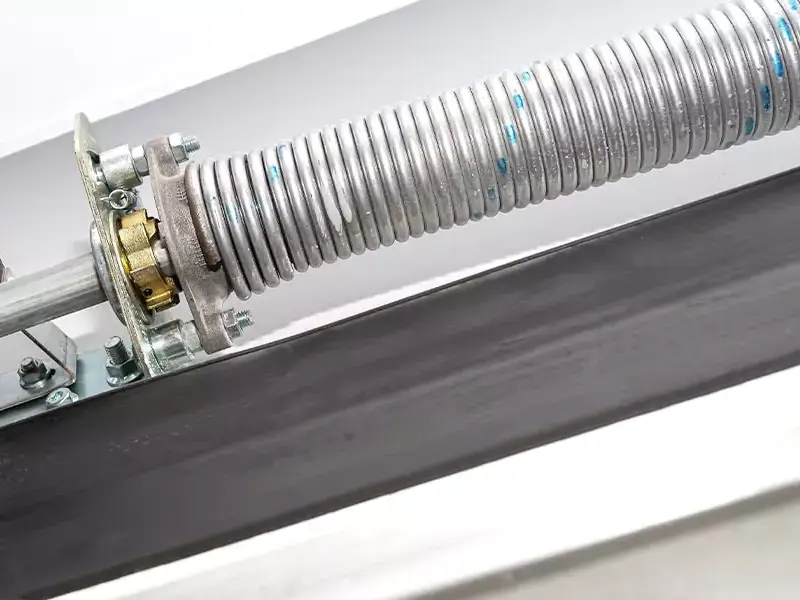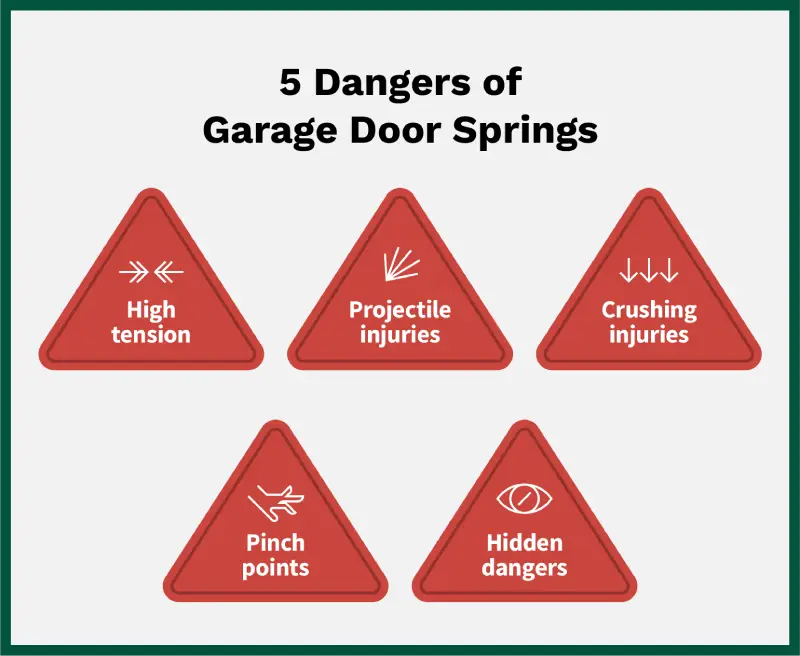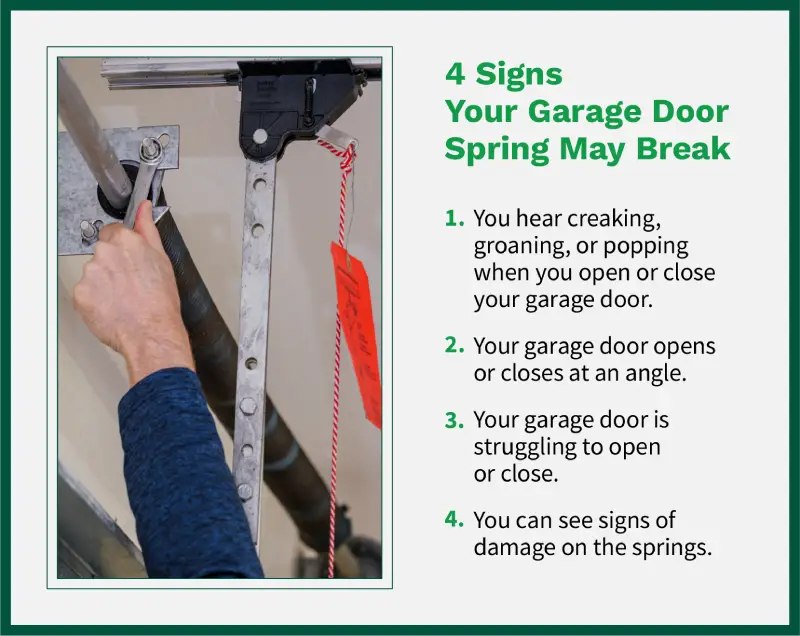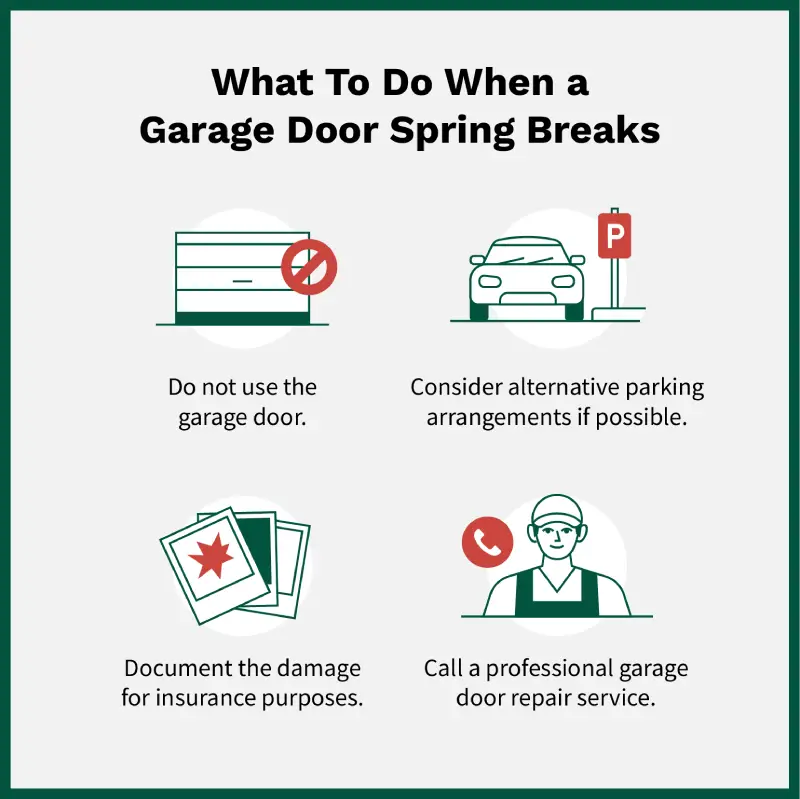
Garage door springs are under immense pressure, making them extremely dangerous. A sudden spring failure can cause severe injuries and damage due to their sheer force and unpredictable movement.
Garage door spring injuries are a serious concern for homeowners. These seemingly simple components are under massive pressure, making them a major hazard if mishandled. Attempting to repair or replace them on your own can be a risky gamble.
While tackling a DIY garage door spring repair might seem like a way to save money, it's simply not worth the risk. Learn what makes garage door springs so dangerous, what to do when a garage door spring breaks, and why it’s best to call in a professional for spring repairs and tune-ups.
Table of Contents:
- Why Are Garage Door Springs Dangerous?
- 4 Signs a Garage Door Spring May Break
- What To Do When a Garage Door Spring Breaks
- How Can I Make a Garage Door Spring Safer?
- Get Professional Garage Door Spring Repair With Precision Garage Door Service
- Garage Door Spring Injury FAQ
Why Are Garage Door Springs Dangerous?
Garage door springs are a hidden hazard in your home. These compact components pack a powerful punch. Understanding the specific dangers they pose is crucial for your safety.
High tension
Garage door springs are under immense tension, storing a tremendous amount of potential energy. This high tension is what allows them to effortlessly lift and lower heavy garage doors.
However, it’s precisely this tension that makes garage door spring accidents so dangerous. If a spring breaks or malfunctions, the sudden release of this stored energy can cause serious injuries and damage.
Potential for projectile injury
Another significant danger posed by garage door springs is the possibility of projectile injury. When a spring breaks, it can violently recoil, sending coils or other components flying through the air. These projectiles can cause severe garage door spring injuries, including lacerations, puncture wounds, or worse.
The force behind a broken garage door spring is substantial, and being struck by a piece of flying metal can have devastating consequences for your health and property. This is why it's crucial to leave garage door spring repairs and replacements to professionals who have the necessary equipment and training to handle these hazards.
Risk of crushing injuries
The immense weight of a garage door is counterbalanced by the tension in its springs. This means that if a spring fails while the door is in motion, there’s a serious risk of someone or something being crushed.
Garage door spring accidents involving crushed body parts are not uncommon, highlighting the critical importance of professional maintenance and repair.
Pinch points
Garage doors are full of pinch points — places where your fingers and other body parts can get caught.
When the garage door is moving, these pinch points become even more dangerous. If a spring breaks or the door malfunctions, you could easily get caught and injured.
Hidden dangers
Garage door springs can be like ticking time bombs — you can't always see the danger lurking. Since wear and tear from the intense pressure happens over time, you might not notice signs that would be obvious to a trained eye.
Garage door service professionals spot problems such as cracks, rust, and weakened coils.

4 Signs a Garage Door Spring May Break
Knowing when a garage door spring is about to break can be like trying to predict the weather — it's impossible. While there are some signs to watch for, it's important to remember that springs can fail without warning.
That's why regular professional inspections are crucial. Trained service professionals have the tools and expertise to identify potential hazards before they become serious problems.
Here are a few red flags to look out for:
- Loud noises: If you hear unusual creaking, groaning, or popping sounds when your garage door opens or closes, it could indicate a problem with the springs.
- Uneven door movement: Does your garage door open or close at an angle? This could be a sign of spring imbalance.
- Slow or sluggish operation: If your garage door is struggling to open or close, it might be a sign that the springs are losing their tension.
- Visible damage: Look for cracks, rust, or coils separating on the springs.
Remember, these are just potential indicators. Even if you don't notice any of these signs, your garage door springs could still be on the verge of failure. Regular professional inspections are the best way to ensure your safety and prevent costly repairs.

What To Do When a Garage Door Spring Breaks
If your garage door spring breaks, it's important to stay calm and put safety first. Attempting to repair it yourself can be extremely dangerous and lead to a serious garage door spring injury. Instead, follow these steps:
- Prioritize safety: Avoid using the garage door until it's repaired. Consider alternative parking arrangements.
- Call a professional garage door repair service: They have the expertise and equipment to handle the situation safely.
- Document the damage: Take pictures of the broken spring for insurance purposes.
A garage door service professional will assess the damage and replace the broken spring with a new one. They will also inspect the other components of your garage door system to ensure everything is working properly.

How Can I Make a Garage Door Spring Safer?
While there's no foolproof way to eliminate all risks associated with garage door springs, you can take steps to make them safer.
One important factor to consider is the type of garage door spring you have. Torsion springs, located above the garage door, are generally considered safer than extension springs, which run along the sides. Torsion springs are enclosed and less likely to cause injuries if they break. However, both types require professional installation and maintenance.
Keep your garage door springs in optimal condition with frequent maintenance:
- Regular inspections: Schedule garage door tune-ups and professional inspections at least once a year.
- Lubricate regularly: Apply a garage door lubricant to moving parts as recommended by the manufacturer.
- Check for damage: Look for signs of wear and tear, such as cracks, rust, or separation of coils.
- Avoid overloading: Don't overload your garage door with heavy items.
- Proper adjustment: Make sure the spring tension is correctly adjusted by a professional.
Even with proper maintenance, garage door springs can still pose risks. Always prioritize safety and never attempt DIY repairs.
Get Professional Garage Door Spring Repair With Precision Garage Door Service
Garage door springs are a serious safety hazard, and attempting to repair them yourself can lead to a devastating garage door spring injury. It's essential to prioritize safety and call a professional for any garage door spring issues.
Don't risk your well-being by trying to handle this dangerous task alone. Schedule a garage door spring repair with Precision Garage Door Service™ today.
This article is intended for general informational purposes only and may not be applicable to every situation. You are responsible for determining the proper course of action for your property. Services should be performed by licensed and experienced professionals. Precision Garage Door Service is not responsible for any damages that occur as a result of this blog content or your actions. For the most accurate guidance, contact a Precision Garage Door Service professional for a comprehensive, on-site assessment.
Garage Door Spring Injury FAQ
Still have questions about your garage door springs? Precision Garage Door Service has the answers. Our service professionals have years of experience dealing with all things garage doors, and we're here to provide clear, helpful information.
How long do garage door springs last?
On average, garage door springs can last anywhere from seven to 10 years, or about 10,000 cycles. The lifespan of your garage door springs depends on several factors, including the type of spring, the weight of your garage door, and how frequently you use it. However, you can extend their life with proper maintenance and regular inspections.
How many garage door spring injuries are there per year?
According to U.S. Census Bureau data, there was an average of 42 garage door injuries per year between 2018 and 2022, although injuries have declined 13.4% annually over the past five years. Most of these were finger and head injuries, which accounted for nearly 50% of all garage door injuries.
Is replacing a garage door spring dangerous?
Yes! Replacing a garage door spring is extremely dangerous and should only be done by a professional who is trained to safely handle them and has specialized equipment. Since garage door springs are under immense tension, mishandling them can result in serious injury or even death, not to mention property damage.
What happens when a garage door spring breaks?
When a garage door spring breaks, it can be a dangerous situation. The spring's primary job is to counterbalance the weight of the heavy garage door. Without this counterbalance, the door can fall rapidly and unexpectedly.
This poses a significant risk that can lead to a garage door spring accident and property damage. Stay clear of the door and schedule an emergency garage door repair service immediately.
Is it safe to use a garage door with a broken spring?
No. Using a garage door with a broken spring is extremely dangerous and should be avoided at all costs. Garage door springs are designed to counterbalance the weight of the heavy door, making it easier to open and close. Without this counterbalance, the door becomes incredibly difficult to operate and poses a serious risk of a garage door spring injury.
How do I get my garage door up when the spring breaks?
Opening a garage door with a broken spring is extremely dangerous. Even when broken, garage door springs may be under immense pressure and can cause serious injuries.
If you suspect your garage door spring is in need of repair, do not attempt to open your garage door. Schedule an emergency garage door repair with experts like Precision Garage Door Service.